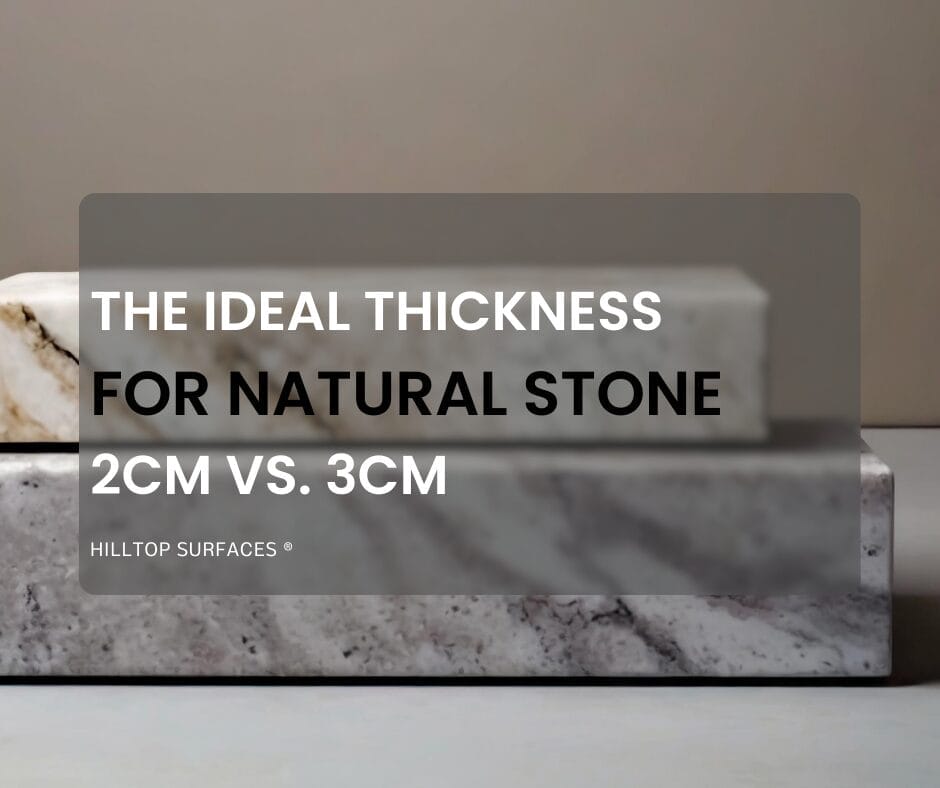In the landscape of interior design, natural stone emerges as a preferred Material for Countertops, offering both beauty and resilience. When selecting Natural Stone, one critical decision homeowners face is choosing between 2cm and 3cm thicknesses. This blog post navigates through the benefits and considerations of each option, aiding in making an informed decision that aligns with design preferences and functional needs.
Which thickness is better for a natural stone countertop 2cm or 3cm?
Selecting the optimal thickness for a Natural Stone Countertop, whether 2cm or 3cm, hinges on balancing aesthetics, functionality, and the specific needs of your space. The 2cm thickness, often celebrated for its sleek and contemporary appeal, suits environments where a modern, streamlined look is desired. It’s lighter, making it a suitable choice for wall cladding and custom furniture, albeit requiring additional support for heavy-duty applications like kitchen counters. Conversely, the 3cm thickness is synonymous with robustness and durability, offering a luxurious feel and inherent stability without the need for extra reinforcement. This makes it particularly ideal for kitchen islands and Countertops where durability is paramount. While the 3cm option may come at a higher initial cost, its longevity and strength provide a worthwhile investment for those seeking enduring quality. Ultimately, the choice between 2cm and 3cm thickness should reflect your personal design preferences, the intended application, and the practical considerations of your renovation project.
2cm Thickness: Elegance and Flexibility
Traditionally favoured in Europe, the 2cm thickness presents a sleek and refined profile. Its lighter weight facilitates easier handling and installation, particularly beneficial for wall-mounted surfaces and intricate designs. The slimmer edge is often seen as more contemporary, appealing to those seeking a modern aesthetic. However, it’s important to note that while 2cm stone offers elegance, it may require additional plywood support when installed as Kitchen Countertops, to enhance stability and durability.
3cm Thickness: Strength and Durability
In contrast, the 3cm thickness is lauded for its robustness and is a standard choice in the United States. This option negates the need for plywood support, offering inherent strength that stands up admirably to wear and tear. The thicker edge provides a substantial, luxurious feel, often preferred for kitchen islands and bathroom vanities where durability is paramount. Additionally, the 3cm thickness ensures a broader range of edge profiles, allowing for more intricate and decorative designs.
Considerations for Your Space
Aesthetics: The choice between 2cm and 3cm thickness often comes down to personal aesthetic preference. Those desiring a lighter, more streamlined look may lean towards 2cm, while individuals favouring a bold, statement piece might opt for 3cm.
Application: Consider the application of the Natural Stone. 2cm might be suitable for bathrooms and custom furniture, whereas 3cm offers added durability for kitchens and high-traffic areas.
Support and Installation: The structural aspects of your space play a crucial role. 2cm stone may require additional support mechanisms, whereas 3cm stone provides greater standalone strength.
Cost Implications: Generally, 3cm natural stone can be more costly due to its increased material volume. However, considering its durability and the absence of the need for plywood support, it may offer a better investment in the long run.
Conclusion: Making the Right Choice
Selecting the right thickness for Natural Stone Countertops is a balance between aesthetic desires, functional requirements, and the specific characteristics of your space. Whether you prefer the sleek elegance of 2cm stone or the robust luxury of 3cm, understanding the implications of each choice ensures that your Natural Stone Surfaces enhance your home for years to come. As trends evolve and personal preferences vary, the decision between 2cm and 3cm thickness remains a testament to the timeless appeal and versatility of natural stone in home design.












